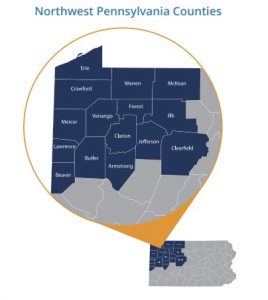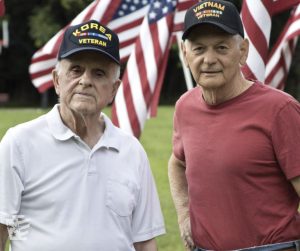Suicide prevention and LGBTQ+ Veterans
 The Northwest Pennsylvania (NW PA) Veteran Suicide Prevention Program operates on a three-pronged approach involving healthcare providers, community organizations, and Veterans and their families. The PA Department of Military and Veterans Affairs (DMVA) is an active partner and responsible for ensuring that the Program integrates current Veteran suicide prevention initiatives throughout the state of Pennsylvania. The following information about the LGBTQ+ Veterans and suicide prevention can be shared with all interested individuals and organizations throughout the state (and beyond).
The Northwest Pennsylvania (NW PA) Veteran Suicide Prevention Program operates on a three-pronged approach involving healthcare providers, community organizations, and Veterans and their families. The PA Department of Military and Veterans Affairs (DMVA) is an active partner and responsible for ensuring that the Program integrates current Veteran suicide prevention initiatives throughout the state of Pennsylvania. The following information about the LGBTQ+ Veterans and suicide prevention can be shared with all interested individuals and organizations throughout the state (and beyond).
Please reach out to us if you have any questions or would like to speak with someone about publicizing the NW PA Veteran Suicide Prevention Program in your community.
Read time: 4 minutes
LGBTQ+ Veterans face unique challenges due to discrimination and barriers to care
By Matthew Miller
Executive Director, VA Suicide Prevention, Office of Mental Health and Suicide Prevention
 Many people don’t think twice about scheduling an appointment with a doctor. Their biggest barriers may be insurance concerns or finding the time for a visit.
Many people don’t think twice about scheduling an appointment with a doctor. Their biggest barriers may be insurance concerns or finding the time for a visit.
But what if you avoid seeking care because of historic attitudes toward your sexual orientation or gender identity? This is the situation many Veterans who identify as lesbian, gay, bisexual, transgender, queer or another minority orientation (LGBTQ+) face.
Further complicating matters is the fact that LGBTQ+ people have greater rates of experiencing suicidality and suicide attempts than their non-LGBTQ+ peers, not due to their sexual orientation or gender identity but because of health care disparities and discrimination. Being aware of risk and protective factors can make it possible to provide appropriate and relevant emotional support when it’s wanted or needed.
Listening to and validating someone’s emotions are two quick ways to help in situations where someone needs support. Providers can also offer visible LGBTQ+-affirming care and a welcoming environment. On a larger scale, there are things anyone can do to help LGBTQ+ Veterans.
Resources for Veterans and their loved ones
 Being affirming of Veterans’ identities is essential. One difficulty in finding support for LGBTQ+ Veterans and to help lower their suicide risk is that many of their specific risk factors are directly related to discrimination, access to care and health equity issues. These things aren’t easy to change immediately because they’re part of a cultural bias toward LGBTQ+ Veterans. More importantly, community members and health care providers can address the barriers and discrimination LGBTQ+ Veterans experience to help reduce this risk factor by talking about why sexual orientation and gender identity matter in health care.
Being affirming of Veterans’ identities is essential. One difficulty in finding support for LGBTQ+ Veterans and to help lower their suicide risk is that many of their specific risk factors are directly related to discrimination, access to care and health equity issues. These things aren’t easy to change immediately because they’re part of a cultural bias toward LGBTQ+ Veterans. More importantly, community members and health care providers can address the barriers and discrimination LGBTQ+ Veterans experience to help reduce this risk factor by talking about why sexual orientation and gender identity matter in health care.
Being aware of other risk factors can empower LGBTQ+ Veterans to get support. Here are some things to think about:
- Loneliness and social isolation. Increased physical and emotional support from your family, friends, co-workers and others can lower suicide risk. Consider joining an LGBTQ+ Veteran group or one devoted to your hobby, or start a group if you can’t find one. Veterans Service Organizations, such as local or national LGBTQ+ Veteran groups, are also good places to find people who understand Veterans and the unique challenges they face. For more information, visit the VHA LGBTQ+ Health Program – Patient Care Services site.
- Firearm ownership. Firearms are the leading cause of suicide among Veterans, and studies tell us LGBTQ+ Veterans are twice as likely to own a gun (a significant independent risk factor for suicide) when compared to non-LGBTQ+ Veterans. Learn about safe and secure firearm storage to help lower your risk.
- Economic and social issues. Homelessness, bias in the military and employment instability are just some factors that can increase suicide risk for LGBTQ+ Veterans. If you’re a Veteran who is homeless or experiencing housing instability, find resources offered by VA’s Homeless Programs. If you need help with job training, education, employment accommodations, resume development and job-seeking skills coaching, VA’s Veteran Readiness and Employment program can offer assistance.
- Sexual orientation and gender identity matter in health care. LGBTQ+ Veterans face increased health risks and unique challenges in accessing affirming health care, especially if providers don’t ask about sexual orientation and gender identity. VHA is working to assure that high-quality care—including suicide prevention—is provided to LGBTQ+ Veterans in a person-centered and respectful environment. Learn more about talking to your provider by reading these patient education brochures. Every facility has a local LGBTQ+ Veteran care coordinator (LGBTQ+ VCC).
Take the Next Step: Participate in QPR (Question. Persuade. Refer) Gatekeeper Training for Suicide Prevention
 Question, Persuade, Refer (QPR) training can help develop risk awareness and confidence in having open conversations with loved ones. QPR is a 2-hour evidence-based program in which individuals are educated about the warning signs of a suicide crisis then taught how to respond, how to offer hope, and how to get help.
Question, Persuade, Refer (QPR) training can help develop risk awareness and confidence in having open conversations with loved ones. QPR is a 2-hour evidence-based program in which individuals are educated about the warning signs of a suicide crisis then taught how to respond, how to offer hope, and how to get help.
- Recall facts about suicide and suicide prevention.
- Identify warning signs of suicide.
- Demonstrate how to ask someone directly about their desire or intent regarding suicide.
- Demonstrate verbal and nonverbal skills used to persuade someone who is having thoughts of suicide to seek and accept help.
- Identify local resources available to help someone who is having thoughts of suicide.
- Describe how to get help for someone having thoughts of suicide.
Please contact us with any questions or to schedule a training session for your business, community organization, or professional association. A printable pdf of our training course list is available to download and share.
Looking to Get Involved?
 Whether you identify as a healthcare provider, community organization, or Veteran, there are several opportunities through the NW PA Veteran Suicide Prevention Program and PERU to connect to resources, participate in educational training, and promote harm reduction strategies. We are actively recruiting healthcare and community partners to work with us in meeting our goals and objectives. To learn more, visit the program website at theresilientveteran.org.
Whether you identify as a healthcare provider, community organization, or Veteran, there are several opportunities through the NW PA Veteran Suicide Prevention Program and PERU to connect to resources, participate in educational training, and promote harm reduction strategies. We are actively recruiting healthcare and community partners to work with us in meeting our goals and objectives. To learn more, visit the program website at theresilientveteran.org.
Need Help? Know Someone Who Does? Contact the National Suicide Prevention Lifeline at 988 or use the online Lifeline Crisis Chat. Both are free and confidential. You’ll be connected to a skilled, trained counselor in your area.

